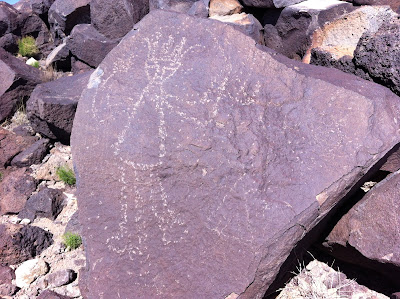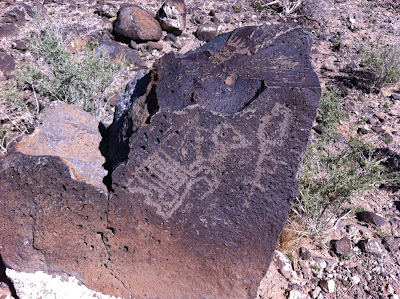The only thing that is a bigger mystery than who will be
voted out of Dancing With The Stars each week is the weather. Today was the
really bad wind day that caused us to hold our departure over, yet it turned
out to be the best weather day since leaving Dallas.
We visited the Acoma Pueblo, which is the oldest continually
inhabited community in the country. It was established in 1158. Can you believe
that? Actually, they first settled a mesa nearby in 650. They relocated after a
tragedy that left access to the top of the mesa impossible. While the majority
of the villagers were on the valley floor tending crops, a large storm came
through. Lightening destroyed the only path to the top of the mesa, stranding a
woman and her granddaughter atop the mesa. Rescue was not possible, and they
were faced with the choice of starving or leaping to their death. Sadly they
elected to jump.
Original Acoma mesa.
The Acoma people tightly control access to the community
atop the mesa. Tourists are bused from the Visitor Center and given a guided
tour of the village. The history is amazing, and it was great to hear it from a
young full-blooded Acoma.
When construction started in the twelfth century the average height of an Acoma adult was 4"6".
View of original mesa from current pueblo village.
Original access to mesa top. Road was built in 1920's.
There was a considerable period in which the Acoma were enslaved
by the Spanish. That ended in 1680 by revolt of all Pueblo Indians in the
region that drove all Spanish from the area. The continuing legacy of that period is 90% of the Acoma
practice Catholicism as well as the ancestral religion. Today a small number of
Acoma tribal leaders live fulltime on the mesa, and the remainder of the homes
remain as second homes for the female descendants of the original inhabitants.
The homes have no water, plumbing, bathrooms, etc. The only electricity would
be from a small generator, but most go without. Primarily the homes are used
when families return to the mesa for significant religious ceremonies. The
remainder of the year they live in nearby towns.
Later in the afternoon we visited Petroglyph National
Monument. The petroglyphs are on volcanic rocks on a escarpment created thousands of years ago when
lava flows miraculously stopped just short of a
subdivision.
Tomorrow’s plan is Sante Fe.












No comments:
Post a Comment